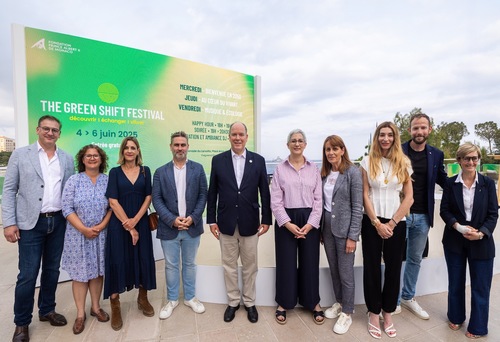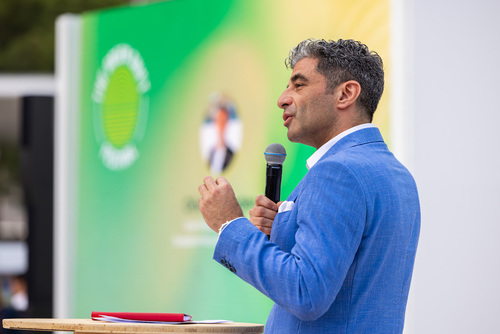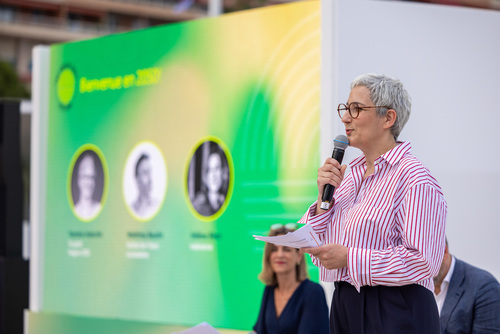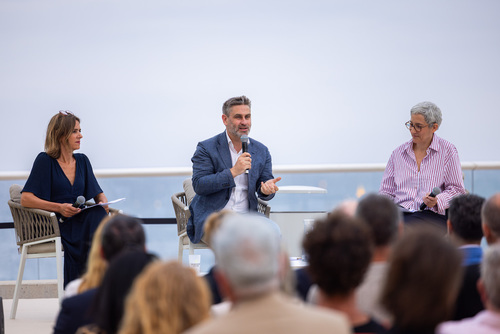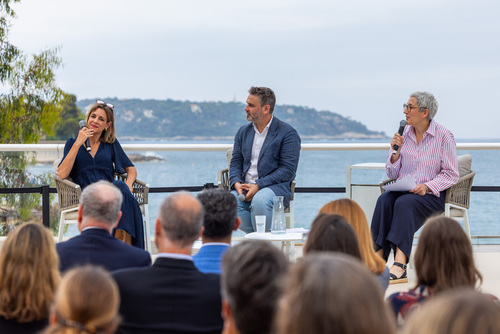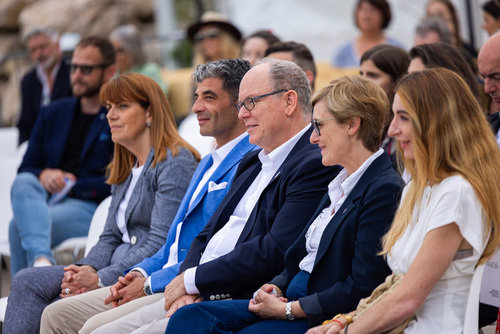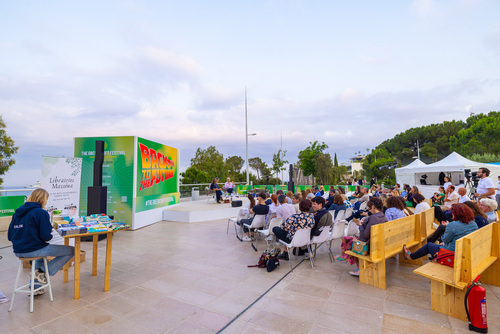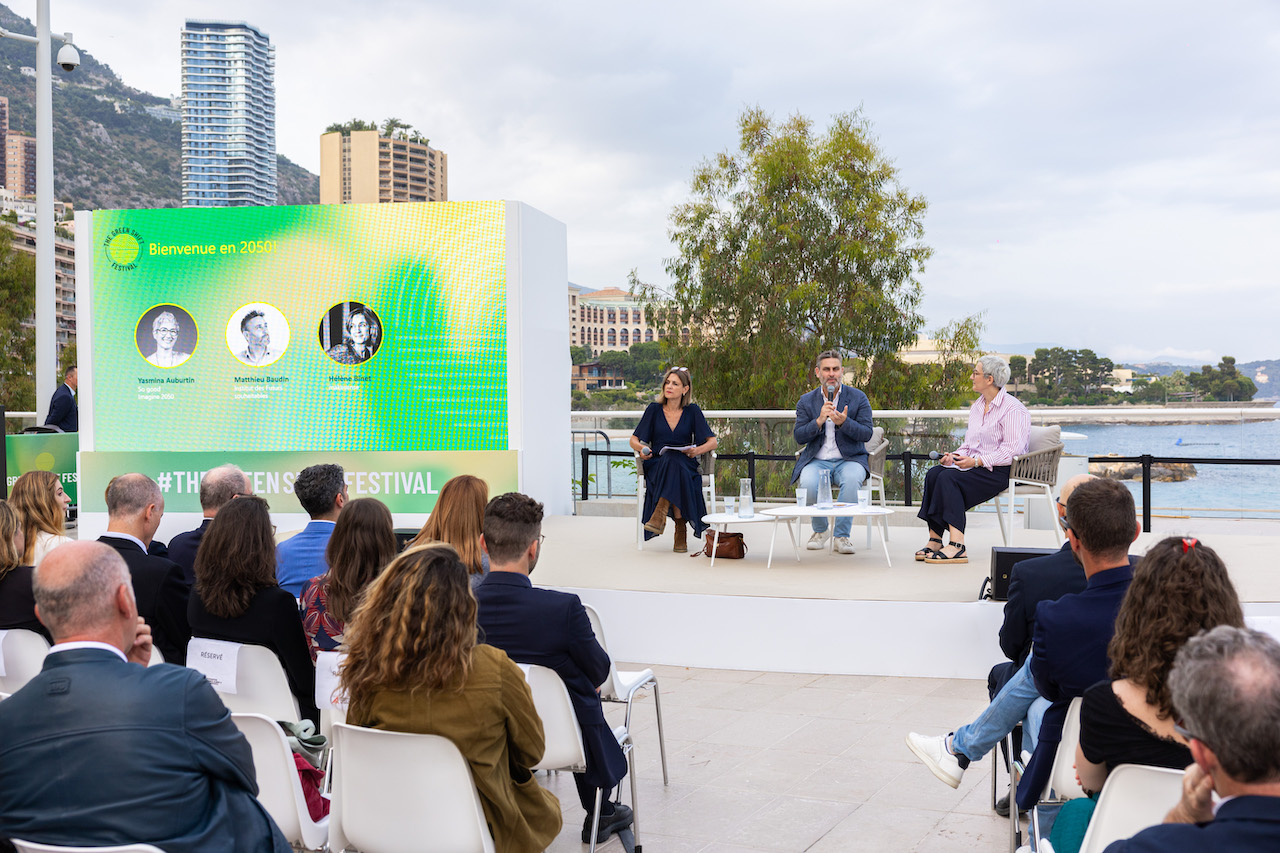
In the face of climate disasters, imagining a desirable future
The Green Shift Festival
Article by Charlotte Meyer published on 12 July 2025 as part of the media partnership between Les Échos and the Green Shift Festival (access the french article online)
The third edition of the Green Shift Festival in Monaco gave a voice to those who are creating scenarios for a future in which ecology has triumphed.
Olivier Wenden, Vice-President and CEO of the Prince Albert II of Monaco Foundation, set the tone for the evening. While the future is increasingly being portrayed in apocalyptic terms, Larvotto Beach was temporarily transformed into a laboratory of utopias. At dusk, three cheerful optimists set about crafting a bright future through a participatory conference-show.
This is not technological fiction. Nor is it a vague utopia. It is a joyfully lucid mental journey," warns Yasmina Auburtin, editorial coordinator for So Good and So Good MAIF Festival.
At her side, Hélène Binet, director of communications and editorial at Makesense, sees herself as an ‘archivist of victories,’ while Mathieu Baudin, historian and director of the Institut des Futurs souhaitables (IFs), takes the title of ‘collector of the future.’ ‘It's not a prediction, but a permission,’ he emphasises. ‘We are going to create an alternate history in the future.’
Bees and dreams
Shared gardens, four-day weeks, reconnecting with nature... Hélène Binet and Mathieu Baudin list imaginary ecological victories. In this ideal 2050, change springs from popular uprisings. The complete ban on pesticides worldwide will have been made possible by the Fourchette Power movement, large banquets organised around the world to demand the prohibition of these molecules, the obligation for municipalities to set up a municipal market, and the widespread availability of cooking classes for all.
‘We owe the Friday off to the students who, as early as the 2020s, wrote opinion pieces saying they would not work for companies that destroy life,’ suggests Hélène Binet, referring to the speech given by AgroParisTech students in 2022, who called for a ‘change of direction’ at their graduation ceremony. "Young people launched a major movement under the slogan “You steal our dreams, you'll get a strike”. They had a long list of demands and called for corporate transparency, consideration of the impact on biodiversity, respect for planetary boundaries, and solidarity,‘ adds Mathieu Baudin, who imagines spending his Fridays ’being curious,‘ in the manner of the Greeks who practised otium, ’ a fruitful leisure activity, a studious asceticism that citizens used to develop their critical judgement before entering society". In this dream 2050, the bonds between all living beings are being re-established. The Declaration of the Rights of Living Beings is enshrined in the constitution and people are appointed to uphold the rights of nature, recognising its right to exist and regenerate. The idea is realistic: in recent years, some companies have already given nature a voice on their boards of directors.
Gone is civic service: now, young people between the ages of 18 and 25 take part in ‘service for the future’, a compulsory service designed to invent ‘what we cannot imagine in the present’. ‘By offering courses on the future, we have unleashed the imagination of an entire generation of children who believe that tomorrow will be what they make of it,’ explains the director of the IFs.
Learning to imagine again
While this vision of 2050 is appealing, the public of 2025 sometimes finds it hard to believe. On Larvotto beach, some people recognise the difficulty of imagining a desirable future. However, one of the keys to a successful transition may well lie in our ability to imagine. ‘We must dare to invent, continue to believe in what is possible and finally open the way to new forms of success, whether collective, sustainable or inspiring,’ insists Olivier Wenden, reminding us that our societies have already been able to transform themselves in the past.
Recently, numerous collectives have emerged with the aim of proposing alternative scenarios for the future. This is particularly the case with the Institut des Futurs souhaitables (Institute for Desirable Futures). Created in 2011, the association sees itself as ‘a school for desirable futures’. It promotes an approach capable of building a more desirable future through various tools. In particular, it offers educational experiences to explore the future, supports organisations and territories in their transitions, and encourages people to draw inspiration from living organisms to invent resilient solutions. ‘We try to imagine a future that is as pragmatic as those who predict the worst,’ explains Mathieu Baudin. He insists that the stories we tell ourselves play a powerful role in shaping tomorrow.
‘For fifty years, we have inevitably imagined a bleak future,’ he laments, expressing concern about our ‘broken’ vision of the future. "During the Belle Epoque, we believed that tomorrow would necessarily be better than today. Nowadays, utopias no longer interest anyone. Something has broken in the muscle of the imagination. Yet tomorrow will be exactly what we make of it. In the tradition of the Renaissance, the IFs has opened a Cabinet of Curiosities of the Future in Paris, an artistic and educational installation bringing together a collection of seventeen surprising objects. These include a bio-inspired halogen rose window capable of transforming CO2 into matter, a luxury bag made of mushroom leather, and a sentient translator, a multi-sensory cane that enhances our perception of living things.
A democratic challenge
Far from being a somewhat naive whim, could our ability to better imagine tomorrow therefore be political? ‘We are sometimes seen as naive idealists,’ admits Hélène Binet.
But while anger and indignation are a driving force, they are not enough to build something. ‘ For fifteen years, Makesense has been empowering citizens to take action on their own scale to invent solutions and modes of action that benefit the world. ’
We want to restore the joy of the present. Behind every element that frightens us lies a solution. Our approach is to give energy and hope. "
‘There is virtue in creating enchanted moments in our lives,’ agrees Mathieu Baudin, who points to the energy generated by last year's Olympic Games as proof. "A year ago, we were considered losers on all fronts, whether from a security, logistical or tourism perspective. But in reality, the egregore [group spirit, editor's note] produced a wonderful and benevolent event. We will remember that we didn't believe in it and that, despite our limited belief, it still happened." Like explorers, the director of the IFs calls for the creation of new horizons.
In Hélène Binet's view, this harnessing of the imagination is a real democratic challenge. By inviting everyone to build a desirable future, it encourages citizen participation and could thus engage a larger section of the population in the ecological transition. ‘When you do this exercise, you want to believe in its self-fulfilling nature,’ she says. With environmental measures currently in decline, the communications director hopes to see the emergence of more enthusiastic ecological collectives. ‘We need to believe that we can do it so that we don't become completely discouraged,’ she insists, calling for the broadest possible connections to avoid withdrawal into isolation.
In recent years, these forward-looking exercises have gained recognition. In 2024, for example, a ‘Kit du futur’ (Kit for the Future) was launched by the Agence des sentiers, Wildproject Publishing, the Cité de l'agriculture and Territoires pionniers to open up discussions about the future. Supported by Ademe, the Citizens' Assembly of Imagination offers an experimental collective writing approach to imagine the fictions of the world to come. All these approaches ultimately stem from the same desire. Contrary to the prevailing pessimistic narrative, they seek to bring forth a positive, stimulating and mobilising ecological narrative.
llustrating this article : photos from the ‘Music and Ecology’ evening at the Green Shift Festival on 6 June 2025 (©Philippe Fitte/FPA2).
